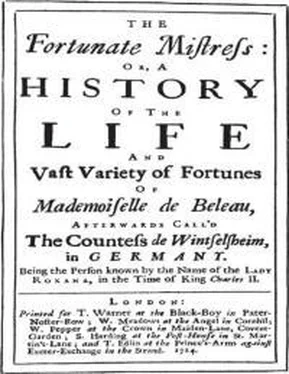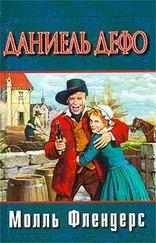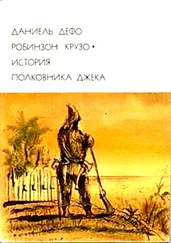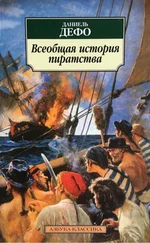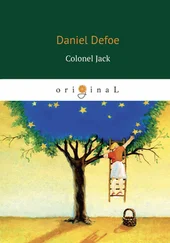Bridewell : a penitentiary in London, used particularly as a house of correction for vagabonds and loose women. The word is often used as a synonym for prison.
teizing : pursuing. Not the modern sense of annoying, but the stronger verb, teise (now obsolete), meaning to drive or chase (a hunted beast).
the Maez from Williamstadt : the Mass from Willemstad.
Figure : situation.
Gust : taste, inclination.
Pretensions : intentions, professions.
cast : defeated.
a Posture to Even : a position to settle.
the ordinary Usage of the Dutch : the merchant is probably aware that his countrymen were often accused of avarice and boorishness.
Bite : trick, hoax.
in order to : to bring about.
Conversation : intimacy, relationship.
the Servant among the Israelites : Exodus 21:5–6.
a Masculine in her politick Capacity : a man in her civil capacity; i.e., she enjoyed the same legal rights as a man.
in her separated Capacity : as a single person. The distinction at law that Roxana is clearly aware of throughout her discussion is between the legal status of the feme sole , who is virtually equal to a man, and the feme covert , or married woman, whose legal status is ‘covered’ by that of her husband.
O! ‘tis pleasant… is Liberty : Charles Cotton, ‘The Joys of Marriage’, II.127–8, in his Poems On Several Occasions (1689), p. 43.
a sincere Affection : the Dutch Merchant presents Defoe’s own views of the proper relationship of marriage partners. See, for example, his Conjugal Lewdness (1727), IV, esp. pp. 118–19.
the Mint : a sanctuary for insolvent debtors and others in Southwark, so-called because Henry VIII kept a mint there. It was finally suppressed in the reign of George I.
conn : con, direct the steering of.
a la Cavalier : cavalierly, without much care.
did not use to court : was not trying to flatter.
pretended : ventured, tried.
my Measure of Wickedness was not yet full : possibly an echo of Matthew 23:31–2.
the Bank at Amsterdam : The Bank of Amsterdam was a celebrated exchange bank, founded in 1609 and dissolved in 1796.
One and twenty Thousand Pistoles : £18,060.
the second Bills : see note 69.
the Briel : Brielle, Holland.
Travel : travail, labour of childbirth.
a Glass-Coach : a coach with glass windows, and hence a private coach hired for so many weeks or months, as distinguished from coaches with unglazed, curtained windows at public stands.
Equipage : coach and footmen.
the usual Insults of Parish-Enquiries : In order to avoid the expense to the parish of bastard children or legitimate children born to women too poor to care for them, the parish officers were aggressively and often offensively forward in inquiring into the legal ‘settlement’ of pregnant paupers. A poor pregnant woman found in a parish where she had no legal settlement would be unceremoniously returned to the parish she had come from. See notes 29 and 30.
the Pall-mall : The houses on the south side of the street overlooked the King’s Garden, next to St James’s Palace, though it is unlikely that any of them had a private door into the garden. Charles II’s mistress, Nell Gwynn, was given a house in this street (on the site of the present No. 79) by the King. Like Roxana, Nell Gwynn had lived for a while in another house near by.
Sir Robert Clayton : Clayton (1603–1707) amassed a huge fortune and became a well-known Whig politician, serving as Lord Mayor of London in 1679–80, and frequently thereafter as a Member of Parliament. He acquired a reputation for avariciousness and unscrupulousness and was twice attacked by Defoe, directly in The Reformation of Manners (1702; reprinted in A True Collection of the Writings of the True-Born Englishman , 1703), and obliquely in A Journal of the Plague Year (1722; Penguin Books, 1966), p. 24. At one time he acted as financial adviser to Nell Gwynn.
Firing : fuel.
the Mall : a fashionable walk in St James’s Park.
One and twenty Thousand, and Fifty eight Pounds : to realize this amount Clayton would have had to invest Roxana’s money at the unusually high rate of 8.5 per cent. See note 180.
no less than 61. per Cent : the usual rate of interest at this time, 5 per cent, was what Defoe considered fair. Clayton’s various investment schemes were probably not meant to sound either admirable or honest.
a true-bred Merchant is the best Gentleman in the Nation : also an expression of Charles II’s, quoted with approval by Defoe in The Complete English Tradesman (1745 ed., reprinted Burt Franklin, 1970), I, 242.
That an Estate is a Pond; but that a Trade was a Spring : a favourite idea of Defoe’s. See The Complete English Tradesman , I, 245, and A Plan of English Commerce , in The Novels and Selected Writings of Daniel Defoe (Basil Blackwood, 1928), p. 75. Defoe uses Clayton as the mouthpiece for several of his own ideas on trade and commerce.
Amazonian : aggressively feminist (from the legendary race of female warriors).
Bites : swindlers.
affecting : caring, inclining.
gave himself a Loose : indulged himself, showed no restraint.
a Sett of fine Musick : music for a number of instruments playing together.
the Play-House : probably the Theatre Royal, Drury Lane. But it is also possible that Roxana means the near-by Queen’s Theatre (later the King’s Theatre), also called The Opera House, in the Haymarket, managed about this time by John James Heidegger, who had introduced masquerades there. See note 219.
some Disturbance : Roxana’s party resembles the large, public masquerades, revived by Heidegger in the early years of the reign of George I, which were immensely popular and had to be guarded.
Читать дальше
